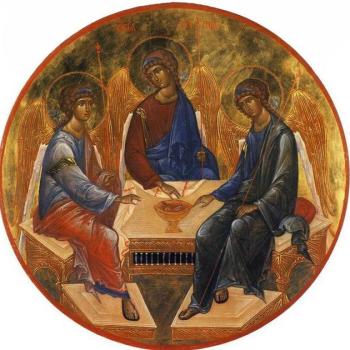Gerald R. McDermott, author of Can Evangelicals Learn from World Religions? and God's Rivals: Why Has God Allowed Different Religions? demonstrates to Christian Evangelicals and others:
The religions are good for theology. God uses the religions to teach the church deeper insight into the meaning of Christ . . . We saw this even in the Bible . . . It may be that some of today's religions portray aspects of the Divine mystery that the Bible does not equally emphasize: for example, the Qur'an's sense of the divine majesty and transcendence . . . Hindu traditions . . . remind Christians of God's immanence when deistic tendencies have obscured it. Theravadin Buddhists may be able to show . . . dimensions of the fallen ego that will shed greater light on what Paul meant by "the old man." Philosophical Daoists may have insights into nonaction that can help Christians better understand "waiting on God." Confucius's portrayal of virtue may open new understandings of radical discipleship . . . I am not saying these . . . (are not taught) in the Bible . . . But many of us . . . see them less clearly than we could . . . God used Aristotle to shed light for Thomas Aquinas on certain aspects of Christ and life with him . . . Peter learned from Cornelius's religious experience and heard God's word through him.
Paul F. Knitter goes even farther: Without Buddha I could not be a Christian. Mega-church pastor Joel Hunter insinuates that Christians and Muslims are necessary complements for each other. Not all Comparative Theologians will go so far, but a vigorous Comparative Theologian can contemplate Jesus, Muhammad, and the Buddha's teachings in order to be (or become) a better Hindu, Jew, Christian, Muslim, Parsi, Sikh, or Baha'i, and to illuminate Comparative Theology itself.
For example, in context, the Buddha's teaching in the Samyuttaka (or Samyutta) Nikaya, a Pali text, indicates reticence in sharing unhelpful truths, but the metaphor the Buddha uses can be adapted to illustrate why examining "leaves" from assorted trees in the religious forest is essential to theology. When the Buddha was staying at Kosambi in a Sinsapa-forest, he took a few leaves in hand, "What do you think, my disciples: which is more, these few leaves I hold, or the other leaves in the wood and the trees above and around us? As the leaves of the forest are more numerous than those in my hand, so are the leaves of truth I have not communicated to you in proportion with those I have communicated."
In the Bible, "Israel" means "God wrestler," or "wrestler with God and humanity" (Genesis 32:28). Comparative Theology correspondingly wrestles with a variety of religious convictions. Even if a Comparative Theologian does not rejoice or agree with every concept of the Divine, she acknowledges that error illumines truth by contrast, just as "geocentrists taught heliocentrists certain things" even though geocentrists were wrong in their overall interpretation of the data.
Even the Comparative Theologian who perceives particular religions as profoundly mistaken can aver with C.S. Lewis, "Good philosophy must exist, if for no other reason, because bad philosophy needs to be answered." But to answer bad philosophy, one must be alert to it and simultaneously vigilant to one's own propensity to be blinded and hobbled by it. What at first blush may appear to be a strange ritual or dastardly doctrine could contain subtle perspicacity or Divine prompts eliciting holy yearning. Gerald R. McDermott comments, "Religions may be inspired in part by other powers, but God has not abandoned whole cultures to perdition and untruth. God is still at work, using even distorted truth to teach truth. And his Spirit is still actively leading individuals within the religions to draw closer to himself." As the Apostle Paul proclaimed in Athens, "God let all nations go their own way, yet has not left himself without witness" (Acts 14:17).
Flourishing Comparative Theology thus demands unfettered, vibrant exchange of ideas. It must embrace dialogue and celebrate passionately the advice of the Rig Veda, "may noble thoughts (or auspicious powers) come to us from every side" (1.89.1) along with the aphorisms attributed to Confucius, "Let three walk together and there I will find instruction. For what is good in them I will follow, and what is not good I will try to modify or reform in myself" (The Analects 7.21) and Voltaire, "I (may) disapprove of what you say, but I will defend to the death your right to say it."
The task for Comparative Theology is not to sew etymological straitjackets to make theology more manageable, but to stretch prevailing categories and forge the Infinite frontier. Instead of perpetually marching in lockstep, Comparative Theology nourishes innovation, hopefully -- though not inevitably for the better. Active dialogue with practitioners and dissenters, and harvesting the fruits of interchange is crucial to all study, including Comparative Theology.




